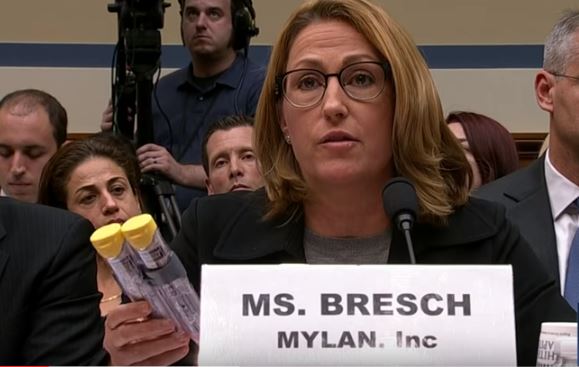Mylan CEO defends EpiPen pricing

Mylan’s CEO, Heather Bresch, has been forced to defend the pricing of its EpiPen under sceptical questioning from US politicians.
Bresch (pictured) was summoned to a hearing in front of the House Committee on Oversight and Government reform, to give evidence on Mylan’s pricing for Epipen (epinephrine), which is the company’s biggest selling product with annual sales exceeding $1 billion.
The price of the life-saving injection for people with severe allergies has increased from less than $100 for a pack of two in 2008, around the time Mylan acquired the product, to more than $600. This has prompted accusations that Mylan has taken advantage of a lack of competition for the drug.
Drug pricing is under intense scrutiny in the US, after it emerged that companies such as Valeant and Turing Pharmaceuticals had inflated the price of some generic drugs.
Mylan has responded to the widespread criticism by producing a generic version of EpiPen, priced at around $300.
The high price of the original EpiPen was down to rising wholesale acquisition cost, Bresch told the committee, who also made great play of Mylan’s decision to give 700,000 free EpiPens to more than 66,000 schools in the US.
She added that Mylan gets revenues of $274 for each pack after wholesale acquisition costs are deducted, although this has increased from net revenue of $235 two years ago.
After cost of goods and other costs are subtracted, Mylan make around $50 per pen, Bresch said.
She told the committee: “I know there is considerable concern and scepticism about the pricing of Epipens. Many people incorrectly assume that we make $600 off of each pen. It’s simply not true.”
But Republican committee chair, Jason Chaffetz, said Mylan would likely make more revenue from the generic Epipens, as they can be sold directly to the patient at $300 each.
Chaffetz was surprised that Mylan had not anticipated the controversy over the pricing of EpiPen. “You raised the price, what did you think was going to happen?”
Democrat Elijah Cummings, who also sits on the committee, noted that the company spends $97m on marketing for EpiPens. Cummings criticised Mylan for failing to provide details of costs related to EpiPen.
The committee also heard from Doug Throckmorton, Deputy Center Director for Regulatory Programs at the US Food and Drug Administration, said he was unable to give details of the number of EpiPen generic rivals that the regulator is waiting to approve.
The FDA reportedly faces a backlog of around 4,000 generic drugs filed and awaiting approval, although the agency denies this figure.











